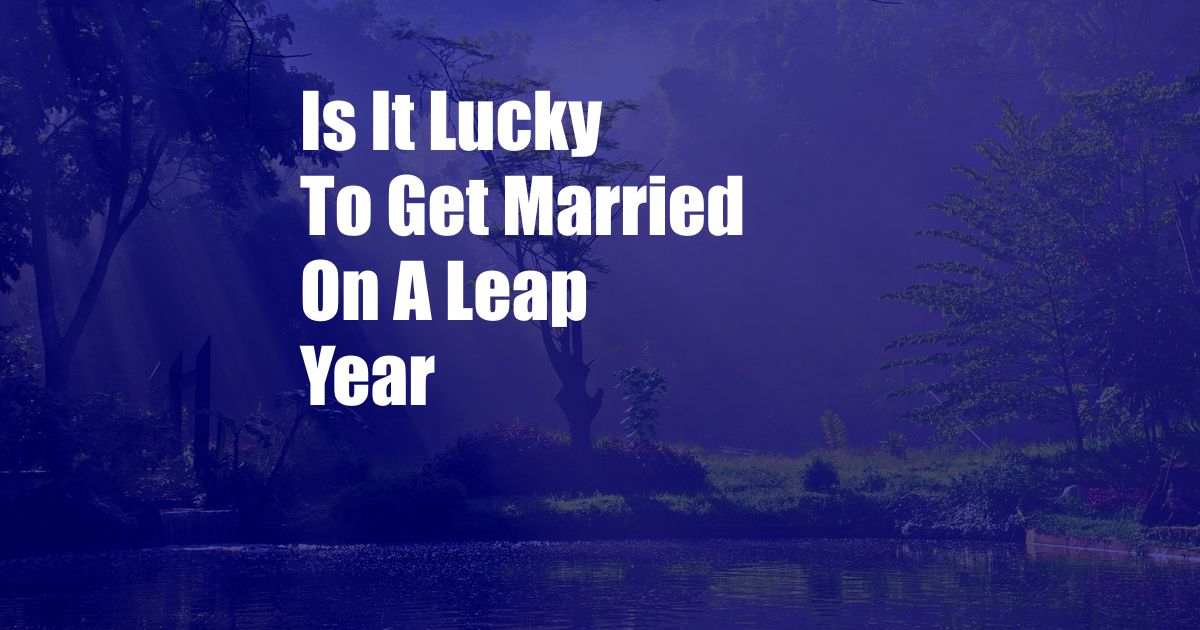
Is It Lucky to Get Married on a Leap Year?
As February 29th, a rare and enchanting day, approaches, many couples find themselves pondering the question: is it lucky to get married on a leap year? Myths and legends have surrounded this extra day for centuries, weaving a tapestry of beliefs and superstitions. While some embrace the notion of heightened fortune, others approach the prospect with caution. Let’s delve into the captivating lore and uncover the truth behind this matrimonial enigma.
The origins of leap year can be traced back to ancient times when the Roman emperor Julius Caesar introduced the Julian calendar in 46 BCE. To align the calendar with the Earth’s orbit around the sun, an extra day was added every four years, creating the phenomenon we know as a leap year. Over time, various cultures have attached their own interpretations and beliefs to this unique day.
The Blessings of Leap Year Matrimony
For centuries, a leap year marriage has been imbued with an aura of luck and favor. In Irish folklore, it is believed that women who propose to their beaus on February 29th will be rewarded with a lifetime of happiness. This tradition is said to have originated from Saint Brigid’s bargain with Saint Patrick, allowing women to propose once every seven years, including on leap year.
Other European cultures share similar sentiments. In Greece, it is considered auspicious for weddings to take place on leap year, as it is believed to bring prosperity and long-lasting love. In Scotland, the saying goes that “a leap year wooer is a true lover,” suggesting that those who propose during this time have sincere and unwavering intentions.
Weighing the Risks
While many cultures embrace the auspiciousness of leap year marriages, there are also those who hold reservations. In some parts of Asia, particularly in China, getting married on a leap year is viewed with apprehension. It is believed that marriages entered into during this time may be susceptible to misfortune, setbacks, and even premature death.
These beliefs stem from the Chinese lunar calendar, which consists of 12 lunar months. A leap year occurs when an extra month is added to the calendar to make it align with the solar year. In Chinese numerology, the number four is associated with misfortune, and a leap year with its extra month is seen as carrying this negative connotation.
Modern Perspectives
In the modern era, beliefs about leap year marriages have evolved, and personal preferences often take precedence over tradition. While some couples may still adhere to cultural beliefs, others approach the decision with a more pragmatic mindset. For them, the significance of a leap year marriage lies in its uniqueness and the opportunity to create a memorable and cherished occasion.
Today, many couples choose to get married on February 29th simply because it is a rare and special date. They see it as a way to make their wedding stand out and to create a lasting memory. Whether you believe in the luck or the risks associated with leap year marriages, one thing is for certain: a marriage built on love, respect, and mutual support will endure the test of time, regardless of the year in which it begins.
So, is it lucky to get married on a leap year? The answer remains elusive, as it depends on individual beliefs and cultural traditions. Whether you embrace the superstitions or dismiss them as mere folklore, the decision of whether or not to marry on February 29th is a deeply personal one. Let the whispers of the past guide you, but ultimately, follow your heart and create a day that is uniquely yours.
FAQs on Leap Year Marriages
Q: Is it true that women can propose to men on leap year?
A: Yes, according to Irish folklore, women can propose to their beaus on February 29th, a tradition said to have originated from Saint Brigid’s bargain with Saint Patrick.
Q: Is it considered bad luck to marry on a leap year in China?
A: In some parts of Asia, particularly in China, getting married on a leap year is viewed with apprehension, as it is believed to carry negative connotations associated with the number four in Chinese numerology.
Q: Is there a scientific basis for the belief that leap year marriages are luckier or unluckier?
A: No, there is no scientific evidence to support the idea that getting married on a leap year has any impact on the luck or success of a marriage.
Q: What is the most popular day for weddings on a leap year?
A: February 29th itself is the most popular day for weddings on a leap year, as couples seek to take advantage of the unique date.
Q: Do all cultures share the same beliefs about leap year marriages?
A: No, beliefs about leap year marriages vary widely across different cultures. In some cultures, it is seen as auspicious, while in others, it is viewed with caution.